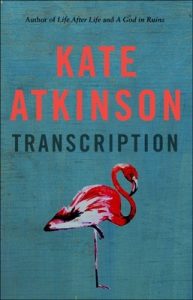
Eighteen-year-old Juliet is a bright young woman plucked from her dull government department job and given what appears to be a similarily prosaic task by MI5: transcribing conversations between Godfrey Toby, posing as a Gestapo agent, and a collection of disgruntled fifth columnists, pleased with themselves at being singled out. Juliet proves adept at her work, her only frustration the puzzling behaviour of her boss, Perry, who seems bent on little more than hand-holding and dry pecks rather than the seduction she’d welcome. Soon, Juliet graduates to full-blown spying in an operation to infiltrate a far more influential ring of Nazi sympathisers than the everyday anti-Semites who meet with Godfrey in Dolphin Square. Flush with success, although chastened by the consequences of overreaching herself, Juliet and the rest of Godfrey’s team continue with Dolly and co until their cover is blown with disastrous results. Ten years later, Juliet is working at the BBC when she spots Godfrey who refuses to acknowledge her. Resurrecting her old spying skills, Juliet becomes embroiled in paranoid speculation as all sorts of faces from the past pop up. Things may not be entirely what they seem, including Juliet.
Transcription switches between 1940 and 1950, telling Juliet’s story from her own perspective. Atkinson is a masterful storyteller, whipping the carpet from underneath her readers several times during Juliet’s journey through the labyrinthine corridors of MI5. Even the apparently straightforward ending is ambiguous given the convolutions that have come before.
‘Oh, my dear Juliet,’ he laughed. ‘One is never free. It’s never finished.’
As ever, with Atkinson there’s a good deal of dry, playful wit to enjoy, particularly in Juliet’s observations of Perry:
A girl could die of old age following a metaphor like this, Juliet thought. ‘Very nicely put, sir’ she said.
‘You were missed.’ (Oh, be still, my beating heart, she thought.) ‘No one makes as good a pot of tea as you do, Miss Armstrong.’
Comedy aside, Transcription has some serious points to make about idealism and national interest some of which rang loud contemporary bells for me. Engrossing storytelling, engaging characters, sharp observation and sly humour – all those sky-high expectations that greet the announcement of any new Atkinson novel were more than met for me. I loved it. Bring on all the prizes.


The publishing event of the year for me – thank goodness it has at last arrived. So pleased to read how much you enjoyed this one – I’m looking forward to getting stuck in even more now! 🙂
Surpassed expectations, Liz, and they were inordinately high! I hope you enjoy it as much as I did.
Off to buy this tomorrow and as I can never just buy one book, and as I am going on holiday next week – I feel a splurge coming on!!
Well, you certainly won’t regret buying this one. Have a lovely holiday, Rachel.
This is one I really want to read. Even more after reading your excellent review, Susan.
Thanks, Paula. One of my books of the year. I’d be surprised if you didn’t love it!
I’m listening to this on R4’s Book at Bedtime at the moment and really enjoying it. With the story at the halfway point, I’m rather intrigued to see how it finishes, especially given your comments on the ambiguity. Nice review as ever, Susan.
Thanks, Jacqui. Lots of trailers for that on the Today programme, even more than for Jaws a few weeks back which seemed a very odd choice for Book at Bedtime. Glad to hear that you’re enjoying it. It’s a splendid book – I’d hoped to see on the Man Booker longlist.
Yours is a much more positive review than the others I’ve read, all of which thought it was not Atkinson at her best. Nevertheless, I shall be reading it as soon as my library copy turns up.
Perhaps it’s beacause it lacks the literary pyrothechnics Of Life After Life or A God in Ruins. I hope you fall into my camp rather than theirs when your copy turns up!
I’ve been seeing news about Transcription everywhere. I have not read Kate Atkinson yet but I love seeing your enthusiasm in reading her new book x
Thank you, Resh! I hope you will read her. I think she’s one of the best writers of her generation.
This sounds just brilliant. Like you, I’m an ardent fan & it’s great to hear it surpassed your expectations! Another library waiting list beckons
You’ve a treat in store with this one.
I love Atkinson too but still have a good few of her back catalogue to get through yet!
Lots to look forward to then, Cathy! I’vbe yet to read a dud Atkinson.
What a sharp and clever voice; I’ll enjoy this one too, I think, but have a couple of her books to catch up with first (the charming Jackson Brodie series, which I’m halfway into and an older one that I’ve missed along the way too). It’s wonderful to have a writer on whom one can rely consistently, even with such varied styles and structures as she has employed.
One of my absolute favourite contemporary writers. The Jackson Brodies are a delight and so different from her other novels. I wonder if she’ll return to him. It’s been a while.
I always feel nervous for an author, whose books are loved by so many, when a new one comes out. (A bit strange, I know…) So I’m relieved to hear you give it a thumbs up – yay!
I’ve yet to read a dud Atkinson, but I do know what you mean. I feel for authors who early on in their careers find their books adorned with puffs from famous names – a blessing and a curse.
Pingback: Reading between the lines? – Annabookbel